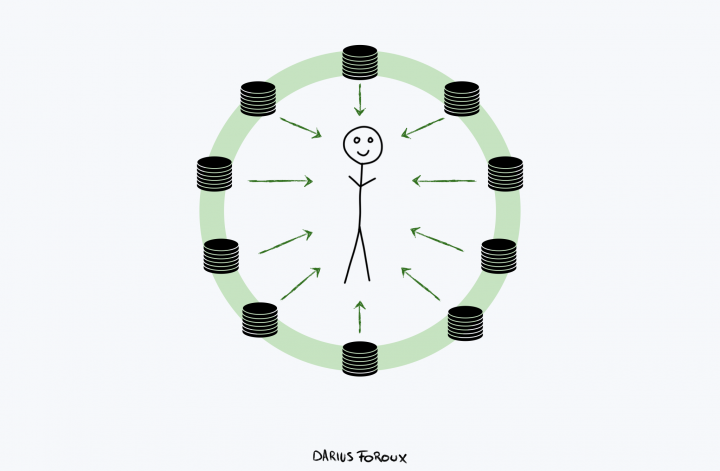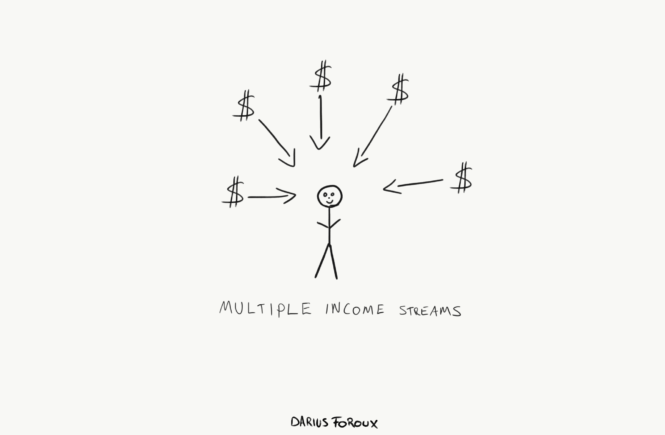Understanding the trends of the global economy helps us decide our careers, finances, and investments.
But that’s hard because who can you trust? Who should you believe?
So many experts, so many opinions.
The fact there’s so much disagreement on where the economy is going shows that nobody really knows where the economy is going. Or when we’ll have recessions. Or when a particular industry will go down or rise.
For example, I had a friend who operated a restaurant because, he said, “People will always need to eat.” To his logic, this ensures that there will always be a demand for good restaurants.
Then Covid came and closed restaurants for a long time. Many of the so-called “stable” industries were suddenly going bankrupt.
It’s difficult to plan for financial freedom and stability when so many things are uncertain.
- What if you lose your job or main income source tomorrow?
- Or if a new technology starts the decline of your industry?
- What would you do? What safety nets do you have?
The economy is in a state of constant change.
The question is: What type of change should we expect in the economy?
In this article, I’ll briefly share the headwinds that are currently slowing down the global economy and discuss the tailwinds that could potentially drive it forward.
This knowledge helps us to make informed decisions about our financial future. In an era of uncertainty, understanding the factors that influence the global economy is not just beneficial – it’s essential.
Factors that slow down the global economy (headwinds)
Let’s start with the bad news. There are various world events and factors that are affecting the global economy in a negative way.
- De-globalization — Ever since Covid, Western countries are trying to bring their production of essential goods closer to home. This ends the process of globalization that started in the 90s. Bringing production closer to home will lead to higher costs, which can lead to higher inflation.
- Weather and animal health conditions — The stuff you buy at the grocery is getting more expensive.1Source: Barron’s One of the biggest causes is the recent heat waves. Food producers are experiencing droughts which are destroying crops, making the food supply scarcer and pricier. Also, whenever animals get sick (like with the Avian flu), the food supply chain encounters problems. That often means increased prices for consumers.
- Ongoing wars in Eastern Europe and the Middle East — Gas prices have gone up ever since the war in Ukraine erupted. The ongoing conflict is worsening in the Middle East, which leads to more instability, more refugees, and disruption in international trade and investment.
- Higher interest — Higher interest rates make borrowing more expensive, which can slow economic growth.
- Demographics — An aging population in many countries means fewer people in the workforce, which slows down company productivity. That usually means there are fewer products produced, and they take a longer time to reach from the factory to the consumer. Which, again, means things get even more expensive. Automation and AI certainly help in these situations. But so far, human labor is still very much needed. (After all, somebody still has to operate the machines to work).
Factors that drive the global economy forward (tailwinds)
Not all things are bad, of course. People who are able to recognize an opportunity tend to do well even in a life full of uncertainty.
- De-globalization — Yes, you read that right. De-globalization is both a headwind and a tailwind. It’s like a coin with two sides. On one side, it poses challenges, but flip it over, and it opens opportunities for countries to strengthen their domestic industries. This could come with more jobs and prosperity close to home.
- Rising consumerism — Luxury brands and goods are experiencing record sales year after year. In my opinion, this is driven by social media. Spending has become the norm. Saving is no longer important to millions of people.
- Technological innovation — AI has been helpful in many industries. It also makes things easier for the public. It’s no surprise that tech companies are some of the most valuable companies in the world. With better tech, work gets done faster and more efficiently. So we can focus more on living our lives.
- Energy transition — As we shift towards renewable energy, new opportunities for growth and innovation emerge in the clean energy industry.
- Government spending — When governments open their wallets and invest in things like infrastructure, it can stimulate economic growth.
We’ve been stuck in a rut of slow productivity growth for a decade and a half.2Source: Harvard Business Review But as more businesses adopt digital technologies and artificial intelligence, we can expect to see more positive changes.
Optimism is the way
There are many doomsday thinkers in the world. They point out the wars, the diseases, the inflation, government debts, and they the world is just getting worse.
It’s true that there are plenty of bad things happening in the world right now. And maybe we’ll even experience more threats to economic growth in the coming years.
But didn’t we constantly face threats for past few centuries? Living in a state of fear is not productive. While it’s important for us to know and understand how economic factors affect the economy, and therefore, our careers, it’s a waste of energy to be consumed by the state of the economy.
Back in 2008, during the world financial crisis, people were panicking and they started pulling their money out of the stock market. In response, Warren Buffett said:3Source: NY Times
“Buy American. I Am.”
He was saying: Stay the course.
Focus on what you control. Invest in yourself and in the companies that improve your life. Look at the headwinds and think, “How can I shield myself from them?”
Look at the tailwinds and think, “How can I profit from them?”
If the majority of the free world does this, we use our collective optimism to drive the economy forward.
Ultimately, the pace of global economy’s future growth isn’t set in stone. We might grow slow, we might grow fast.
What’s matters is the we keep growing.




